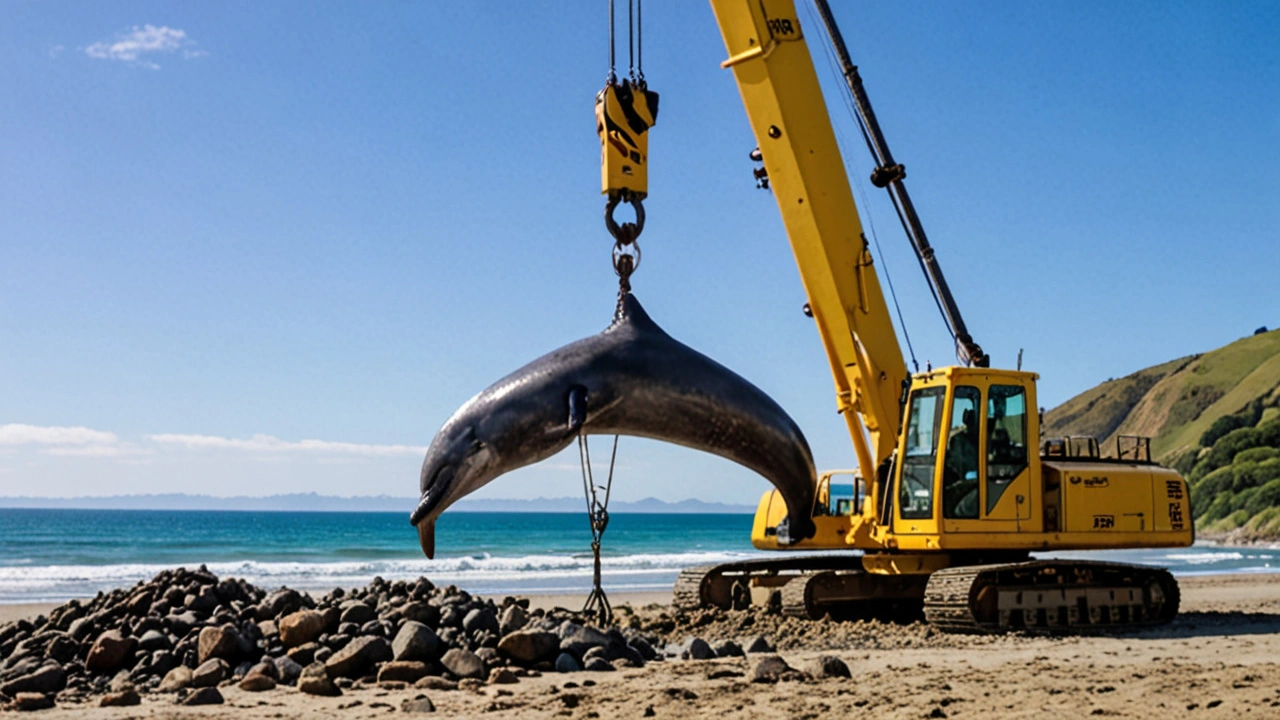Rare Spade-Toothed Whale Found on New Zealand Beach Offers Unprecedented Insights

A Rare Discovery on New Zealand's South Island
The recent discovery of a rare spade-toothed whale on a beach in New Zealand has sparked significant excitement within the scientific community and beyond. This marine creature, never before observed alive, was found dead earlier this month. The whale was identified based on specific characteristics such as color patterns, skull structure, beak shape, and teeth.
The spade-toothed whale, measuring five meters in length, is a species shrouded in mystery. With very few documented sightings, this discovery at the Taiari river mouth in Otago province on New Zealand's South Island provides a unique opportunity for scientists to gain valuable insights. The whale's remains are currently stored in a cold facility, awaiting DNA analysis, a process that will take weeks to finalize due to the scarcity of the species and the need for meticulous verification.
Scientific Significance and Conservation Implications
This finding holds significant scientific and conservation implications. The Department of Conservation (DOC) underscores the importance of studying such a rare specimen. Due to the limited knowledge about spade-toothed whales, any new information is invaluable for understanding marine biodiversity and the ecological roles of these enigmatic creatures.
The species was first described in 1874 based on jaw and teeth fragments from New Zealand's Chatham Islands. Despite this early identification, the spade-toothed whale has remained elusive. Only a handful of specimens have been documented globally, including stranded whales off New Zealand's North Island in 2010 and 2017. Each discovery has contributed to a small but growing pool of knowledge about this rare mammal.

Involvement of the Māori Community
Given the cultural significance of whales to the Māori people, the DOC plans to involve local Māori communities in determining the next steps for the whale's remains. In Māori culture, whales are considered sacred treasures, and their involvement ensures that cultural traditions and respect for the species are upheld. This collaboration highlights the importance of integrating traditional knowledge and modern science in conservation efforts.
Understanding an Elusive Species
The scarcity of live sightings of spade-toothed whales has made it challenging for scientists to study them in their natural habitat. Therefore, discoveries like the recent one are crucial for expanding our understanding. Researchers have relied on skeletal remains from various findings to confirm the existence of this species and shed light on its unique characteristics.
The spade-toothed whale, with its distinct features, presents intriguing biological questions. For instance, what are its feeding habits, migration patterns, and social structures? How does it interact with other marine species, and what role does it play in its ecosystem? These are some of the questions that scientists hope to answer with the newfound specimen.

Potential for Future Research
As researchers work on the DNA analysis of the whale's remains, they are poised to unearth critical information that could lead to breakthroughs in marine biology. Advanced genetic studies could provide insights into the evolutionary history of spade-toothed whales and their relation to other cetaceans. Such knowledge could inform broader conservation strategies and efforts to protect marine biodiversity.
The discovery also underscores the importance of continuous monitoring and exploration of marine environments. Each uncovering of a rare or previously unknown species highlights the incredible diversity of life beneath the ocean's surface and the necessity of preserving these ecosystems from threats such as climate change, pollution, and over-fishing.
A Call to Action
This remarkable finding is more than just a scientific curiosity; it is a call to action for marine conservation. Protecting the habitats of these rare creatures ensures the survival of species that we are only beginning to understand. As the world faces mounting environmental challenges, such efforts are critical in maintaining the delicate balance of marine ecosystems.
To sum up, the discovery of the rare spade-toothed whale on a New Zealand beach is a milestone in marine biology and conservation. It offers a rare glimpse into an elusive species and underscores the importance of integrating scientific research and cultural traditions. As scientists and the Māori community work together to honor and learn from this magnificent creature, we are reminded of the vast mysteries that the ocean holds and our responsibility to protect them.
10 Comments
WILL WILLIAMS
What a splash! This find is pure magic, a real boost for marine science!
Barry Hall
Nice work, team 🙂
abi rama
Seeing a spade‑toothed whale finally surfacing in research feels like a collective win. It reminds us how much ocean mystery still lies ahead. The collaboration with Māori iwi adds a priceless cultural layer. Hope the DNA work unlocks more answers soon.
Megan Riley
This is absolutely thrilling!!! The specimen could rewrite chapters of cetacean evolution!!! Never thought we'd get a chance to study such a rare beast, lol!! The blend of science and Māori tradition is simply awe‑inspiring??!
Lester Focke
The unprecedented accession of a Physeteridae specimen warrants rigorous scholarly examination. Such a specimen, hitherto confined to fragmented osteological records, now affords a holistic morphological appraisal. I anticipate that the ensuing genotypic analysis will substantially augment our phylogenetic frameworks.
Naveen Kumar Lokanatha
i totally agree with the need for rigour the data will be priceless but we must also keep the process swift enough for conservation actions
Alastair Moreton
Oh great, another whale to add to the list-just what we needed for the marine meme archive.
Surya Shrestha
Indeed, the addition of yet another cetacean specimen enriches our collective ichthyological corpus, thereby enhancing the depth of marine biodiversity discourse.
Rahul kumar
The DNA sample from the spade‑toothed whale is a goldmine for marine biologists. We can finally map its genetic lineage and see how it fits with other toothed whales. Preliminary sequencings suggest a divergence that dates back millions of years. That means this species survived major oceanic shifts that wiped out many relatives. Understanding those adaptations could teach us how modern whales might cope with climate change. The mitochondrial genome will reveal migration patterns that are otherwise impossible to track. If we find unique metabolic genes, we might discover new biochemical pathways. Those pathways could even have biomedical applications down the line. Moreover, comparing its genome with that of the beaked and sperm whales will clarify evolutionary pressures. The specimen also offers an opportunity to study dental morphology at the molecular level. Researchers can link tooth enamel proteins to feeding habits inferred from fossil records. Such integrative studies bridge paleontology and modern genetics in a way we rarely get. The involvement of Māori knowledge holders ensures that the research respects cultural values. It also provides a platform for co‑producing science that benefits both communities. All in all, this find could set a new benchmark for collaborative marine research worldwide.
mary oconnell
Ah, the epistemic scaffolding of cetacean genomics-so elegantly presented, yet one wonders if the funding committees will actually allocate resources beyond the buzzwords.

Write a comment